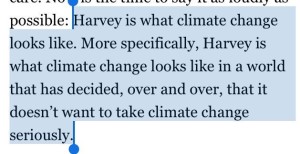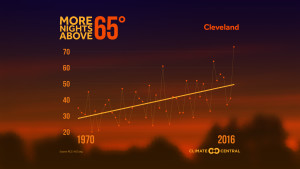August 30th: Harvey reminds us that we should treat climate change as we treat other public health threats. That’s the argument in this New York Times op-ed: Harvey, the storm that humans helped cause.
 August 29th: The most sobering hot-take on Harvey is by Eric Holthaus: Harvey is what climate change looks like.
August 29th: The most sobering hot-take on Harvey is by Eric Holthaus: Harvey is what climate change looks like.
August 27: Michael Mann offered a clear explanation of the climate change-Hurricane Harvey connection.
Climate change boosts hurricanes through higher and hotter seas say @KHayhoe @AndrewDessler: The relationship between hurricanes and climate change.
August 26: Rapid hurricane intensification, like we’ve seen with Harvey, is consistent with climate change, writes Chris Mooney.
August 25: First tanker crosses Arctic from Europe to Asia-without icebreaker help. Fleet of 15 coming soon.
August 24:Alaska’s permafrost is thawing, and that has huge implications, locally, regionally, and globally. (My colleagues Beth Herndon and Lauren Kinsman-Costello are studying how permafrost melt, wetlands, carbon, and phosphorus interact in the Alaskan tundra.
 August 23: As the number of warm nights is increasing, it makes it harder to recover from heat waves.
August 23: As the number of warm nights is increasing, it makes it harder to recover from heat waves.
August 22: Britain’s seabird colonies face catastrophe as warming waters disrupt their food supply. But we don’t know exactly how big problem is because the UK government won’t fund a new seabird census. The last one was done in 2000.
August 20: High Ground Is Hot Property as Sea Level Rises: Climate Gentrification in Miami.
August 19: Climate gloom and doom? Bring it on. But we need stories about taking action, too. (via @ClimateCuddles)
August 16:Humid heat waves that can kill healthy people in hours will affect millions in South Asia in decades.
August 15:
NASA: Last month was the warmest month ever measured on Earth.
July 2017 was 2.25°C above 1980-2015 annual average, a tie w/ Jul & Aug 2016. pic.twitter.com/AaZm7jdH8L— Eric Holthaus (@EricHolthaus) August 15, 2017
August 14th: 91 volcanoes discovered under the West Antarctic Ice Sheet!!!! This is so exciting on multiple levels, from the pure geo-nerdery to the potential climate change impacts. Geeking out. (Read Andrew Freedman’s article for all of the details, but its possible that (1) geothermal heating associated with the volcanoes will contribute to melting and destablization; (2) melting the ice sheet could enhance volcanic activity as the pressure is released; and (3) the volcanoes will help anchor the ice sheet in place and reduce the possibility of catastrophic collapse. These are not mutually exclusive possibilities.)
Scientists have discovered 91 more volcanoes lurking beneath the melting West Antarctic Ice Sheet. https://t.co/mhpN6CcYlv pic.twitter.com/qW0X7yX43T
— Andrew Freedman (@afreedma) August 14, 2017
August 13th: Flooding in Miami now happens every spring tide. Rainfall & storm surges don’t help out either. I liked the headline in the Washington Post: “Flooding in Miami is no longer news – but it is certainly newsworthy.”
August 12th: Sometimes you just have to laugh, so you don’t cry. Talking about climate politics, with humor. Thanks, Stephen Colbert.
August 11th: Climate change fueled a mega-rainstorm that flooded Louisiana 1 year ago, and the vulnerable people caught in the flood are still picking up the pieces. Special and important reporting by Climate Central.
August 10th: A new paper in Science shows that European floods have shifted in timing, up to 2 weeks earlier per year, since 1950. What’s particularly intriguing about the study is that the timing shifts haven’t just occurred in snowy regions, but also in places where rainfall is causing water tables to rise and soils to become more saturated earlier in the spring.
August 9th: Erratic weather affects subsistence rice farmers in Madagascar, further proof that some of the worst climate change impacts will be felt by those least responsible for causing it.
August 7th: Peru’s glaciers have made it a laboratory for adapting to climate change. It’s not going well. This is a really nice feature story from the Washington Post.
August 5th: A new report says that extreme heat & weather could kill 50x more people per yr in Europe by 2100 than today. That may be overestimate, but a more reasonable number in the report is that 2 out of every 3 Europeans will be affected by weather disasters (per year?) compared to 1 in 20 today. Heat waves will account for 99% of all the excess deaths predicted, and it’s awfully hard to relocate away from a heat wave.
August 4th: If you are not yet listening to @ourwarmregards smart & human commentary on climate change, what’s stopping you?
New @ourwarmregards today! We talked about the dangers of techno-fixes, sci fi, and overpopulation: https://t.co/kjPXcBt27j
— Dr. Jacquelyn Gill (@JacquelynGill) August 4, 2017
August 2nd: A visualization that condenses space and time to tell a powerful story about the local and global impacts of climate change through the 20th century and beyond.
Temperature anomalies arranged by country 1900 – 2016 ?. #dataviz #climate #climatechange #globalwarming Download ?: https://t.co/JnaU0tKDlc pic.twitter.com/w3yjmddpOe
— Antti Lipponen / @anttilip.bsky.social (@anttilip) August 1, 2017



Nice plan for content warnings on Mastodon and the Fediverse. Now you need a Mastodon/Fediverse button on this blog.